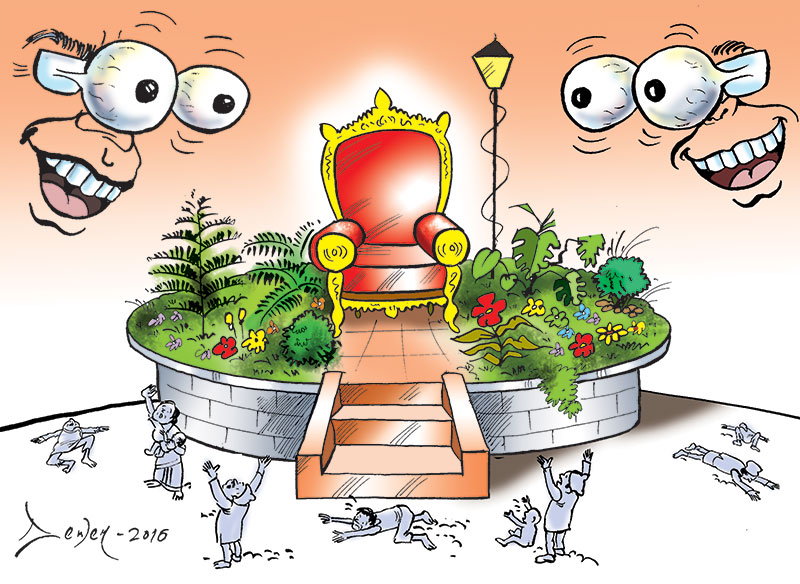
OR
Politics of deception
Published On: July 19, 2016 12:35 AM NPT By: Mahabir Paudyal | @mahabirpaudyal

Anyone who succeeded Sushil Koirala as prime minister would have had only two real choices: Stand up to India or surrender
The government of KP Sharma Oli, like its predecessors, was failing on multiple fronts, including on governance but it could have been made functional and accountable. Nepali Congress and Madheshi parties (as opposition) and Maoist Center (as a coalition partner), together, could have put pressure on Oli to deliver on his promises.
Or even before that, Congress could have prevented Oli’s coalition from taking shape. It could have forged an alliance with then-UCPN (Maoist) and Madheshi forces nine months ago and formed its own government. Or, after Sushil Koirala, it could have let Oli lead the erstwhile Congress-UML-Maoist coalition until the time of implementation of the new constitution. After all, the new constitution was/is outcome of the three-way cooperation. They should thus have ideally faced Indian economic blockade, Madhesh mayhem and post-earthquake reconstruction together.
Congress and Maoist Center could have come up with credible roadmap to resolve the issues raised by Madheshi and Janajati forces. They could have brought their proposal on revising provincial boundaries and addressing grievances on citizenship provisions. Given that they are complicated issues, they could have made their positions clear on other governance-related issues raised by Federal Alliance. Ninety percent of Federal Alliance’s demands call for broader governance reforms: Freeing judiciary and other government bodies from political meddling, ending the culture of bhagbanda in politics, dismantling mafia rule, controlling black-marketing and ensuring regular supply of essentials at affordable costs, ending institutional and policy-level corruption and doing away with nepotism and favoritism in appointments to constitutional bodies, among others.
But this was not the priority of Congress and Maoist Center.
Today we are being told Congress and Maoist Center are coming together to deliver where Oli failed. I wish it were so.
Congress and Maoist Center have accused KP Oli of failing on three fronts: He could not expedite post-earthquake reconstruction; he spoiled the relation with India; and he failed to address the demands of agitating Madheshi parties. All three claims need to be seen in a context.
True, Oli failed to reach out to earthquake victims. He politicized National Reconstruction Authority. But Congress was at the helm for the first seven months after the earthquakes. It was Congress-led government which had determined how much money would be provided to quake victims and in how many installments. Now the same party thinks the victims deserve all the money at once and holds the parliament hostage.
Nepal’s relation with India had started to deteriorate as early as in August, 2015. New Delhi and its intelligentsia had started to dictate our federal map as the country was preparing the final draft of the constitution. Pushpa Kamal Dahal and Sher Bahadur Deuba had been summoned to Delhi in July 2015. It has emerged that ruling BJP leaders had requested them to mention “religious freedom” in the constitution, instead of secularism.
The Indian economic blockade is attributed to failure of these two leaders to include Indian concerns, despite their commitment to Indian leaders.
In the lead up to the promulgation of new constitution on September 20th, 2015, Indian pressure had intensified so much that leaders involved in constitution-making began to confide with journalists: Desai rahaneki narahane abastha chha (“the country’s very existence is at threat.”). Faced with this unimagined situation, the three parties dared to go against India and promulgated the constitution, to which India responded with an economic blockade.
How soon have we forgotten the reality!
Whosoever succeeded Sushil Koirala in October 215 would have had only two choices: Dare to stand up to India or surrender.
What was never told to the public but something that hung like a sword of Damocles over Congress and Maoist leaders was the prospect of prosecution for war-time crimes. Dahal had said on May 13: “If I must go to jail for war-era atrocity, so should Sher Bahadur Deuba as the prime minister during Maoist insurgency.” With the seven-point understanding the two have rather secured their place in Singha Durbar.
Needless to say, certain demands of Madheshi forces are irresoluble. That no hill provinces must have direct access to India, that not a single hill district should be connected with Tarai districts, that the entire Tarai plains should be separated from the hills while revising federal boundaries, and that there should be no distinction between naturalized citizens and native citizens are such demands. If Madheshi forces were flexible on these matters, their demands could be addressed irrespective of who led the government.
Madheshi forces want review of the amended provision on electoral constituency delineation. They want population to be made the sole basis of constituency delineation. Congress leader Minendra Rijal, the architect of this amendment, had ruled out making population the only basis. “There is no example of a country that has made population the sole basis for constituency delineation,” he had said to this scribe in January.
Congress, Maoist Center and Madheshi forces are complicit in the misrule of KP Oli in more ways than one.
Oli government revived the bill to provide additional perks and lifelong facilities to former VIPs—former presidents, vice presidents, prime ministers, chief justices, speakers and a number of others. This will cost billions to state coffers. No one spoke against this.
The government increased the discretionary spending of a parliamentarian from three million rupees to five million this year. It raised the budget for Constituency Development Fund from 1.5 million to 30 million rupees, at a time the media has reported of rampant misuse of this money by parliamentarians. Nobody spoke against this.
A group of parliamentarians is manipulating state policies in legislature parliament to serve their vested interests. They are misusing authority to hijack health, education and governance reform agendas. An old and frail doctor has again put his life on the line for medical education reforms.
They try to ignore him as much as possible.
Gagan Thapa and Dhana Raj Gurung break the silence sometimes. But they also soon succumb to acquiescence.
Political scientist Hari Sharma put it succinctly in his interview with Republica in June. “When it comes to issues of broader concerns of the people, the opposition is silent. But there is political unity when it comes to sharing resources and benefits. Political consensus in Nepal has become political connivance,” he said.
Sometimes the devious players themselves fall into the trap they set. In 2008, Pushpa Kamal Dahal promised to make Girija Prasad Koirala the first president of republic Nepal. Dahal had to vacate Singha Durbar in nine months because he did not keep that promise with GPK. Dahal continues to regret that decision.
Late Sushil Koirala promised to hand over the reins to KP Oli after constitution promulgation. But Koirala broke that promise, leading Oli to build an alliance with Maoists and RPP-N.
In May, Oli promised to make Maoist chairman Dahal the prime minister after budget presentation. Oli deceived Dahal and we have Congress-Maoist coalition in the making. Once Dahal becomes the PM, he will try to flout his “gentlemen’s agreement” with Deuba, making yet another Congress-UML coalition likely.
Perhaps the only reward of the new bid at government change is that it could provide a much-needed face saver for agitating Madheshi forces.
You can make some predictions. With Madheshi forces joining the government, the country will be able to sideline irrational demands on federalism. Then it will be the turn of the CPN-UML as the opposition to shed tears for earthquake victims and lack of progress on implementation of the constitution. New Delhi will be happy. There is already an editorial in The Hindustan Times celebrating the prospect of Congress-Maoist Center government and inclusive democracy in Nepal.
But leopards can’t change their spots. With the same set of opportunistic leaders taking turns to rule, you might as well start writing an obituary for the government in the making.
@mahabirpaudyal
You May Like This

Politics of narcissism
Narcissistic leaders focus on themselves and their self-interests, even at the expense of the citizens. They are arrogant, authoritarian,... Read More...

Can school teachers get involved in politics?
KATHMANDU, May 11: At a time when school teachers' active participation in politics is being criticized, the teachers affiliated to... Read More...

Minister urges teachers not to bring politics into classrooms
MYAGDI (REPUBLICA): Education Minister Giriraj Mani Pokharel said that the trend of teachers entering school premises with political motive would... Read More...
_20220508065243.jpg)

Just In
- Over 400,000 tourists visited Mustang by road last year
- 19 hydropower projects to be showcased at investment summit
- Global oil and gold prices surge as Israel retaliates against Iran
- Sajha Yatayat cancels CEO appointment process for lack of candidates
- Govt padlocks Nepal Scouts’ property illegally occupied by NC lawmaker Deepak Khadka
- FWEAN meets with President Paudel to solicit support for women entrepreneurship
- Koshi provincial assembly passes resolution motion calling for special session by majority votes
- Court extends detention of Dipesh Pun after his failure to submit bail amount

















Leave A Comment